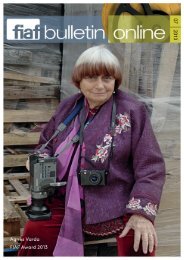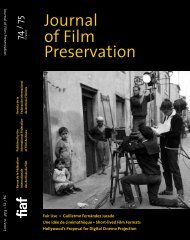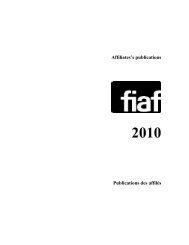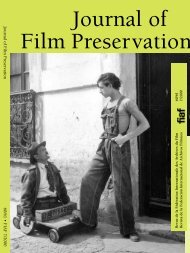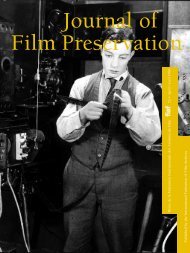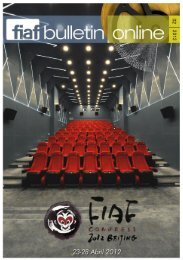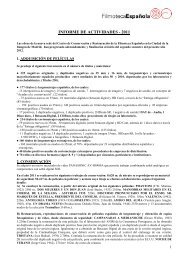Journal of Film Preservation N° 56 - FIAF
Journal of Film Preservation N° 56 - FIAF
Journal of Film Preservation N° 56 - FIAF
You also want an ePaper? Increase the reach of your titles
YUMPU automatically turns print PDFs into web optimized ePapers that Google loves.
present-day audiences these terms may function as formulas to allay<br />
post-colonial feelings <strong>of</strong> guilt, to which this material doubtlessly appeals.<br />
But such a response tells more about these audiences than about the<br />
films, as such labels <strong>of</strong>ten completely ignore that the films in fact show<br />
more than just colonialism - or what we think colonialism is. The films<br />
may not have given a proper image <strong>of</strong>, or even a voice to, the people<br />
filmed, but apart from documentating the fascinations and blind spots <strong>of</strong><br />
their beholders, they also retain traces <strong>of</strong> the situations, the encounters<br />
in which they came about. These labels, in other words, don’t do justice<br />
to the specific character <strong>of</strong> cinematic records. In contrast to, for instance,<br />
written sources, filmed reports presuppose a direct contact with those<br />
who are being filmed. For that reason, ‘colonialism’ or ‘imperialism’ are<br />
awkward, abstract terms for these films, shorthand for a complex <strong>of</strong> factors,<br />
forces and influences. While together these make up social, political,<br />
and economic reality, this reality, it is assumed, only partly<br />
determines the shape <strong>of</strong> actual contacts, both filmed and unfilmed.<br />
The Amsterdam Workshop, an initiative <strong>of</strong> the Research Department <strong>of</strong><br />
the Nederlands <strong>Film</strong>museum, is a festival-cum-conference in which, on<br />
the basis <strong>of</strong> screenings <strong>of</strong> a selection <strong>of</strong> films from NFM’s collection, film<br />
historical and -archival topics are addressed that have not been studied<br />
closely or programmed extensively. What we want to realize with this<br />
workshop is a re-animation, re-vision, and re-evaluation <strong>of</strong> this so-called<br />
colonial material in an international context. With ‘The eye <strong>of</strong> the<br />
beholder’ we want to contribute to the international ‘research agenda’<br />
and bring together experts who have either been working in this area or<br />
those whose views we think are worthwhile for discussing this topic. It<br />
is our assumption, moreover, that as an archival source film has neither<br />
been mined adequately nor exhaustively. The workshop, therefore, is<br />
also an opportunity to stress the importance <strong>of</strong> film archives in general<br />
for work in this area, not only for historians, but also for anthropologists,<br />
social historians, etc.<br />
Secondly, we want to make this material known and visible again. We<br />
want to look for formats in which this material could be screened and<br />
programmed in ways that are acceptable to present-day audiences, or<br />
even challenging. After all, television documentaries and news programmes<br />
especially have contributed to an hesitation, to say the least, in<br />
showing this material.<br />
Participation in the Amsterdam Workshop is exclusively by invitation.<br />
The NFM prefers to keep the number <strong>of</strong> participants restricted in order<br />
to guarantee fruitful discussion. However, in order to ensure ‘virtual participation’<br />
by a larger audience, the discussions will be taped, edited and<br />
published on the Internet soon after the Workshop.<br />
3 <strong>Journal</strong> <strong>of</strong> <strong>Film</strong> <strong>Preservation</strong> / <strong>56</strong> / 1998<br />
L’Atelier d’Amsterdam proposera des<br />
projections et des conférences qui, autour<br />
d’une sélection de films du NFM, abordera<br />
ont des sujets d’histoire et d’archivistique qui<br />
n’ont pas été étudiés ou programmés jusque<br />
là. L’Atelier se propose une re-animation, une<br />
re-vision et une re-évaluation de ce matériel<br />
que l’on serait tenté de qualifier de colonial<br />
dans le contexte international habituel.<br />
La participation à l’Atelier est exclusivement<br />
sur invitation. Pour permettre une participation<br />
« virtuelle » plus large, les discussions<br />
seront enregistrées, éditées et publiées sur<br />
Internet.<br />
La mirada del espectador<br />
El Nederlands <strong>Film</strong>museum organiza, del 22<br />
al 25 de julio de 1998 su tercer Taller de<br />
Amsterdam. Intitulado La Mirada del<br />
espectador, éste tendra por objeto el estudio<br />
de películas de la colección del NFM sobre<br />
sociedades no occidentales y no urbanas<br />
realizadas por directores occidentales para<br />
públicos occidentales. El interés de estos<br />
filmes, concebidos como meros productos de<br />
diversión, reside sobre todo en el hecho que<br />
documentan la manera de ver de estos<br />
directores y de estos públicos, ilustrando así<br />
los sentimientos, fantasías e ideas (preconcebidas)<br />
sobre los temas filmados.<br />
Una de les preguntas importantes a la que el<br />
Taller procurará responder es : « ¿Qué<br />
debemos, como archiveros, historiadores,<br />
cineastas, hacer con este material hoy en<br />
día ? ».<br />
El Taller propondrá proyecciones y<br />
conferencias y abordará temas de historia y<br />
de archivística no estudiados o programados<br />
hasta entonces. El Taller se propone una reanimación,<br />
una re-visión y una re-evaluación<br />
de material que se podria calificar un tanto<br />
precipitadamente como colonial, en el<br />
contxto internacional.<br />
La participacion al Taller es exclusivamente<br />
sobre invitación. Para facilitar una<br />
participación « virtual » más amplia, las<br />
discusiones seran grabadas, editadas y<br />
difundidas por Internet.



